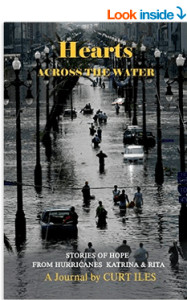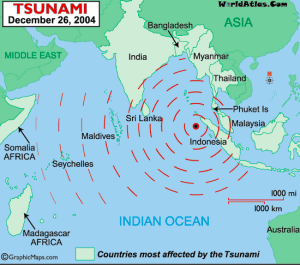A word from Curt
As the tenth anniversary of the Louisiana hurricanes approaches, we’re sharing stories from our book, Hearts across the Water. This week’s posts concern the aftermath of the Indonesian tsunami. I was part of a team that worked there in March 2005.
Beginning next week, we’ll share stories from Katrina and Rita.
I believe you’ll enjoy today’s post. It’s a reminder that in the midst of sorrow and tragedy, there are still things to smile and laugh at.
Enjoy, smile, and laugh.
Today’s word is Gratitude.
Each day I’m feeling so much better and the three months of sickness is being replaced by a deep feeling of thanksgiving.
Lord, don’t let me lost a sense of gratitude for You and all of the blessings/gifts you give us. Amen.

Read a sample chapter of the new ebook version of Hearts across the Water.

Chapter 6 : “Get it down… Keep it down”
Even in the midst of the human tragedy of a tsunami and its aftermath, humor still finds its place. This is my favorite story from Sumatra.
Upon arriving in Jakarta, the Indonesian capital of over eight million people, we went through orientation of how to act and behave when we were to later travel the 1000 miles to Northern Sumatra. We were instructed as to the unusual customs and social taboos found in this part of the world.
I knew what my major challenge would be: my left-handedness.
In Asia, the use of your left hand for many things is forbidden.
This is due to their view of the left hand as unsanitary and offensive. To put it delicately, they use their left hand for cleaning themselves after going to the bathroom. Therefore to point with, touch with, wave at, or hand something with your left hand is a cultural taboo.
I’ve only been left-handed for 49 years so it is extremely difficult for me to remember this. Our team was constantly reminding me of this genetic shortcoming of mine.
Chris, an American who had been a lifelong Indonesian resident also talked about the ins and outs of eating what is set before you. He laughed as he shared what he called the missionary prayer:
“Lord, I’ll get it down, but you’ll have to keep it down.”
Eating habits and cuisine in Asia are very different from ours in America.
Once in China I looked down at a plate of rice and chicken to see various parts of the chicken staring back at me, including the feet and head. That image still lingers in my mind.
Upon arriving in Sumatra we found the meals to be extremely to our liking. The Indonesian cooks at the house enjoyed watching the hearty appetites we had toward their cooking.
Emma, one of our American volunteers, had previously spent two years in Indonesia. She understood the local customs as well as the language. On this particular evening, Emma was in the kitchen inspecting the pots filled with food for supper. Nearby two Indonesian women scurried back and forth in preparation.
The American paused at one boiling pot and smelled it in search of what was cooking in it.
The older of the two Indonesian cooks saw Emma’s inspection. She sniffed derisively, “What is the matter? Do you not like what we are cooking for you Americans?”
Emma quickly replied that she loved their food and simply was curious as to what tonight’s entrée was.
The Indonesian cook was not satisfied with that answer so she added, “I don’t see why you wouldn’t eat that. You Americans will eat anything!”
Emma didn’t want to get into an argument but couldn’t resist asking for elaboration, “What do you mean we will eat anything?”
The Indonesian’s mood lightened up as she smiled and replied, “Oh yes, you Americans will eat anything. You even eat worms!”
Emma’s curiosity was now heightened, “What do you mean about we Americans ‘eating worms?'”
“Oh yes,” replied the cook, “You Americans eat worms. I saw that on ‘Fear Factor.’ ”
Emma laughed, as we did too, when she later related the story.
In fact, I bet you are laughing now as you read this.
But there is a serious and sad thought to this story. In much of the world, especially Northern Sumatra, which is shut off from the outside world by the combined elements of civil war, martial law, and Islamic extremism, what they know about the United States is what they see on television.
The idea that people perceive is that Americans eat worms and do the disgusting things shown on reality TV.
And that we live, dress, and act like the stars of American television and movies.
In the coming days of our Sumatran sojourn I was reminded that I was representing my country as well as my Lord.
How I carried myself and behaved would influence the perceptions of my country among these folks who’ve never seen an American until the tsunami arrived.
Our Indonesian cooks would bring our meals to us. I wasn’t always quite sure what the majority of it was. But once again I would mutter under my breath the words of the missionary’s prayer,
“Lord, I’ll get it down but You’ll have to help me keep it down. And Lord if possible don’t let it be worms. Amen and amen.”

Get your ebook copy of Hearts across the Water at Amazon‘s Kindle Store.
If you enjoyed today’s story, please share it with your friends. Word of mouth is how our stories and books become connected to new readers. You are an integral part of this.
We enjoy hearing from folks like you. Feel free to comment, say hello, and even suggest corrections.
Post Contact Form
This goes at the bottom of some posts
 Creekbank Stories Curt Iles, Storyteller
Creekbank Stories Curt Iles, Storyteller
